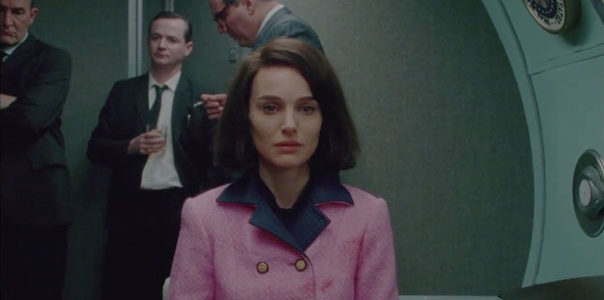
ReelBob: ‘Jackie’
By Bob Bloom
No one encapsulated the life of celebrity — of living in that public fishbowl — as much as Jacqueline Kennedy Onassis.
This private woman was thrust into a whirlwind life of politics and campaigning after marrying up-and-coming politician John F. Kennedy, who rose from Massachusetts senator to president of the United States.
Jacqueline Kennedy played the dutiful wife, traveling the country, shaking hands and making small talk with strangers to further his career.
It was a role she was uncomfortable playing, but she hid her anxiety and handled her part superbly.
After her husband was elected, she decided to add some class and culture to the “people’s house,” making it her mission to heighten sophistication and art through example.
The assassination of John F. Kennedy threw a very glaring spotlight on this quiet woman, thrusting her into the public eye in a manner never before experienced by any first lady.
And, that, basically is where we meet her in “Jackie,” which is not a biopic, but a character study of a woman in turmoil — trying to maintain her dignity and secrecy, preserve her husband’s legacy, take care of her young children and get on with a life that has been cruelly and brutally interrupted — all under the scrutiny of an inquisitive and curious public and media.
As portrayed by Natalie Portman, Jacqueline Kennedy is a soft-spoken woman with a public spine of steel.
She also is a mass of contradictions — yearning to be away from the public eye, yet turning her husband’s funeral into national pageantry to cement his memory into the minds of the American people.
Her pain is excruciating; yet — for the most part — she must bear it stoically — at least in public — to maintain the image of gracefulness that she and JFK fostered for their family and his administration.
Jackie battles Kennedy’s family and the new Johnson administration to give her husband a funeral worthy of Lincoln.
The question is whether she is being selfish — doing all this for JFK or for herself — or is she desperately seeking the embrace of the people for them both as a sign of reassurance that the 1,000 days in the White House were meaningful.
The brilliance of Portman’s performance is that you can view Jackie from both prisms.
It is difficult to fault her erratic behavior. Truthfully, how many of us have had our spouse’s brains shattered by a bullet before our eyes?
The trauma and mental anguish Jacqueline Kennedy experienced over those days after Dallas is something none of us can truly imagine.
In an instant, she was transformed from glamorous first lady to grieving first widow, while a gaping public, as well as political demands, did not afford her any time to truly process the scope and horror of Nov. 22, 1963.
Portman’s performance encompasses all these conflicting emotions. It could earn her a second Academy Award — or at the least, a best-actress nomination.
“Jackie” has some flaws — an intrusive and distracting musical score, as well as a rather wooden performance by Peter Sarsgaard as Bobby Kennedy.
Otherwise, “Jackie” is an extraordinary and intimate look at an iconic figure who put her stamp on the White House, the nation and our perception of grace and beauty.
Bob Bloom is a member of the Indiana Film Journalists Association. His reviews appear at ReelBob (reelbob.com) and Rottentomatoes (www.rottentomatoes.com). He also reviews Blu-rays and DVDs. He can be reached by email at bobbloomjc@gmail.com or on Twitter @ReelBobBloom.
JACKIE
3½ stars out of 4
(R), graphic violence, language